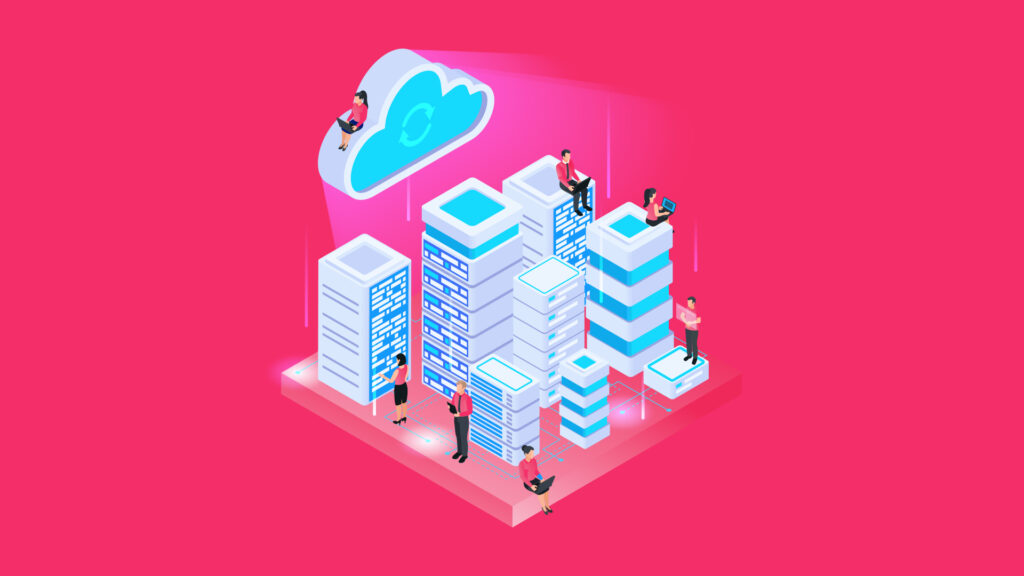Why Your Business Needs a Scalable Software Solution to Grow in 2025 ?

At present, the world is witness to a hyper digital generation. Gearing up for immediacy when it comes to the uptake of scalable software solutions for business. Antiquated and rigid systems will render businesses incapable of surmounting inefficiencies and slow growth, all of which will steep the organization in operating costs as 2025 approaches. Today businesses are not competing just on product and price; they are competing on agility, efficiency, and innovation.
With rising customer expectations, increased market competition, and rapid technological advancements, scalable software is no longer a luxury—it’s a necessity. Companies that are using scalable software solutions are in a better position to handle growth, integrate new technologies, and future-proof their operations.
But what exactly is a scalable software solution, and why is it so critical in 2025? Find all this in the blog post below.
What Is a Scalable Software Solution?
A scalable software solution is a system designed to grow and evolve alongside your business. Unlike traditional software, which may become outdated or inadequate as a business expands, scalable software can handle increasing workloads, larger datasets, and higher user demands without compromising performance.
Scalability in software ensures that as your organization’s needs change—whether due to increased customers, expanded services, or evolving technologies—the system can seamlessly adjust to accommodate these shifts. It prevents bottlenecks, optimizes performance, and ensures long-term sustainability.
Key Characteristics of Scalable Software:
Cloud-Based Architecture

Cloud computing enables businesses to scale resources up or down as needed. Cloud-based software can handle traffic spikes, support remote operations, and integrate with other cloud services, ensuring flexibility and seamless expansion.
Modular Design
A modular approach allows businesses to add, modify, or remove features as required. Instead of replacing an entire system, companies can simply scale up by adding new functionalities, making it a cost-effective and efficient solution.
Automation and AI Integration

Modern scalable software integrates automation and artificial intelligence (AI) to streamline repetitive tasks, enhance decision-making, and boost efficiency. Automation helps reduce human errors, while AI-driven analytics provide deeper insights for data-driven growth.
High Performance and Speed
Performance scalability ensures that software maintains speed and efficiency even with an increased user base. Advanced caching, optimized databases, and distributed computing help maintain a seamless user experience as demand grows.
Robust Security and Compliance

As businesses expand, so do their cybersecurity risks. Scalable software solutions incorporate multi-layer security protocols, encryption, and compliance features to protect sensitive data and meet regulatory requirements like GDPR, HIPAA, or SOC 2.
Seamless Integration Capabilities
Scalable software should easily integrate with existing tools, APIs, and third-party applications. This ensures that businesses don’t face disruptions when adding new tools to their tech ecosystem.
By adopting scalable software, businesses eliminate the risk of outgrowing their technology, ensuring they remain competitive and efficient as they evolve.
Looking for a technical partner to help integrate Scalable software solutions in your business?
We Can Help
Why Your Business Needs Scalable Software in 2025
Future-Proofing Your Business
Market trends and consumer behaviors shift rapidly. A business that can’t adapt will quickly become obsolete. Scalable software ensures your company remains agile, ready to integrate new features, and capable of adopting emerging technologies with ease. It allows businesses to stay ahead of competitors by responding quickly to industry changes and evolving customer needs.
For instance, businesses that failed to transition to eCommerce or digital-first models struggled during the pandemic, while those with scalable solutions thrived. Scalability ensures that your business isn’t just surviving but growing with the times.
Cost-Effective Growth
Traditional software often requires expensive upgrades, licensing fees, and additional infrastructure as the business grows. Scalable solutions, particularly cloud-based ones, allow businesses to pay for only what they use, making expansion more affordable.
Instead of investing in costly IT infrastructure upgrades, companies can scale resources up or down based on demand. This prevents unnecessary expenditure while ensuring that software solutions remain efficient and effective.
Example: A growing eCommerce business can scale its cloud storage and computing power during peak sales seasons without committing to permanent, expensive server upgrades.
Improved Efficiency and Productivity
Manual processes and fragmented systems slow down workflows. Scalable software incorporates automation, real-time data access, and streamlined operations, boosting employee efficiency and reducing downtime.
With scalable solutions, businesses can:
- Automate repetitive tasks like data entry, inventory management, and reporting.
- Reduce operational silos by integrating systems for better collaboration.
- Leverage AI-powered analytics to make informed decisions faster.
This means employees spend less time fixing software issues and more time focusing on strategic growth initiatives.
Enhanced Customer Experience
Customers expect fast, seamless, and personalized interactions. Scalable solutions help businesses handle increased traffic, integrate AI-powered customer support, and offer personalized recommendations without performance issues.
A scalable CRM or eCommerce platform, for example, can adjust to high-traffic periods, ensuring customers don’t face lagging websites or delays in customer service. AI-driven chatbots and personalized marketing automation further improve the overall user experience.
Example: An online retailer can implement an AI-driven recommendation engine that adapts to customer preferences, boosting sales and satisfaction without requiring major infrastructure changes.
Need a future-proof Ecommerce store or Mobile app to Enhanced Customer Experience?
Our Experts Can Help!
Better Data Management and Security
With cyber threats on the rise, businesses must prioritize data security. Scalable software solutions offer advanced encryption, compliance features, and disaster recovery plans, ensuring business continuity and customer trust.
Key security features of scalable software include:
- End-to-end encryption: Protects sensitive customer and business data.
- Automated compliance updates: Ensures businesses meet GDPR, HIPAA, and other regulations.
- Cloud-based backups: Prevents data loss and minimizes downtime in case of cyberattacks.
For businesses dealing with sensitive customer data, scalability ensures that growth doesn’t come at the cost of security vulnerabilities.
Latest Trends and Use Cases of Scalable Software in 2025
Automating Businesses with AI
AI isn’t just buzz anymore. It is changing whole industries faster than anyone could have predicted. AI-enabled solutions are merely making businesses smarter and more efficient, from automating the routine to providing limitless insights.
- Hyper-Personalized Advertising: AI analyzes consumer behavior and delivers super-customized offers and recommendations to target the consumer.
- Intelligent Chatbots: Virtual assistants are contemporary and apt for instant connections, thus improving customer service without so much human effort.
- Predictive Analytics: Companies are using AI to predict standing demand, optimize inventory levels, and enable data-guided decisions.
Example: An e-commerce company employs AI-powered chatbots serving instant customer support using customer information to steer other marketing strategies. The end objective? Higher engagement with better conversion rates.
Cloud computing and Hybrid Cloud Models
The shift is not slowing down with cloud computing and right now; businesses are being more strategic about it. Hybrid cloud models—where companies combine public and private cloud infrastructure—are becoming the go-to choice.
- Scalability on Demand: Businesses can expand seamlessly without overhauling their infrastructure.
- Cost Efficiency: Say goodbye to expensive on-premises servers—cloud solutions optimize expenses.
- Stronger Security: Hybrid models offer robust data protection and disaster recovery options.
Example: Startups and enterprises alike are leveraging AWS, Microsoft Azure, and Google Cloud to scale their operations efficiently while keeping data secure.
Low-Code and No-Code Development
Not a coder? No problem. Low-code and no-code platforms are democratizing software development, allowing businesses to create applications without needing an entire IT team.
- Faster Development: What used to take months now takes weeks—or even days.
- Cost Savings: Companies can build apps without hiring large developer teams.
- User-Friendly Interfaces: Drag-and-drop features enable non-tech users to create powerful applications.
Example: Small businesses are turning to platforms like OutSystems and Bubble to build scalable apps without hefty development costs.
Blockchain for Business Security and Transparency
Blockchain isn’t just about cryptocurrency. It’s revolutionizing business security, transactions, and record-keeping.
- Fraud Prevention: Provides tamper-proof records, reducing the risk of data breaches.
- Smart Contracts: Automates business agreements, eliminating intermediaries and delays.
- Data Integrity: Ensures transparency and accuracy in financial and operational records.
Example: Retailers use blockchain to verify product origins, reducing fraud and increasing consumer trust.
Edge Computing for Real-Time Processing
With IoT (Internet of Things) growing, businesses are shifting from centralized cloud computing to edge computing—processing data closer to the source.
- Faster Decision-Making: Reduces latency, allowing real-time insights.
- Better Efficiency: Optimizes network usage by processing data locally.
- Improved Reliability: Ensures systems remain functional even with limited cloud access.
Example: Smart factories use edge computing to analyze real-time production data, enhancing efficiency and reducing downtime.
Choosing the Right Scalable Software for Your Business
Assess Your Business Needs
Before jumping in, take a step back. What challenges are you facing? What are your growth projections? The best scalable software isn’t the most expensive—it’s the one that aligns with your needs and future plans.
opt for Cloud-Based Solutions
Flexibility, remote access, and seamless scalability make cloud-based solutions a no-brainer. Platforms like AWS, Google Cloud, and Microsoft Azure offer real-time updates, backups, and dynamic expansion capabilities.
Look for AI and Automation Features
AI-driven features aren’t just about convenience—they save time and money. Automated workflows in CRM, ERP, and customer service tools help businesses eliminate repetitive tasks and focus on strategy.
Prioritize Security and Compliance
With cyber threats on the rise, security can’t be an afterthought. Look for software that meets industry standards like GDPR, HIPAA, or SOC 2. Features like multi-factor authentication and data encryption add an extra layer of protection.
Evaluate Vendor Support and Integration
Your software is only as good as its support team. Choose vendors with a strong track record of responsive customer service, regular updates, and seamless integration with your existing tools.
Need Reliable partners for all your business needs?
Our Experts Can Help!
Conclusion
Businesses that hesitate to adopt scalable software risk falling behind in 2025. Whether it’s automation, security, cloud computing, or AI-driven solutions, scalability is no longer optional—it’s the foundation of long-term success.
The good news? The right software is out there. And the sooner you implement it; the sooner you’ll see the benefits.
The Time to Scale Is Now, the time to act!
 Shopify
Shopify













